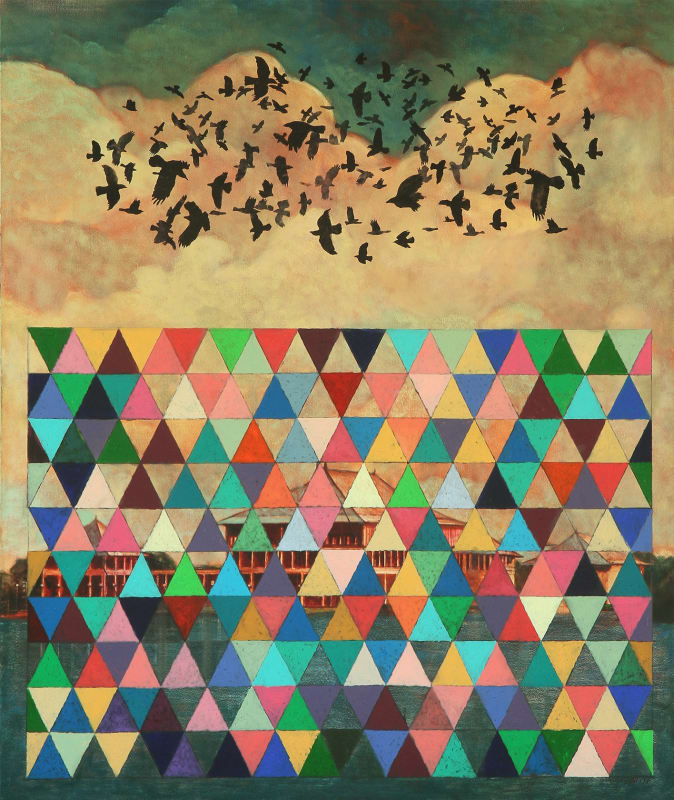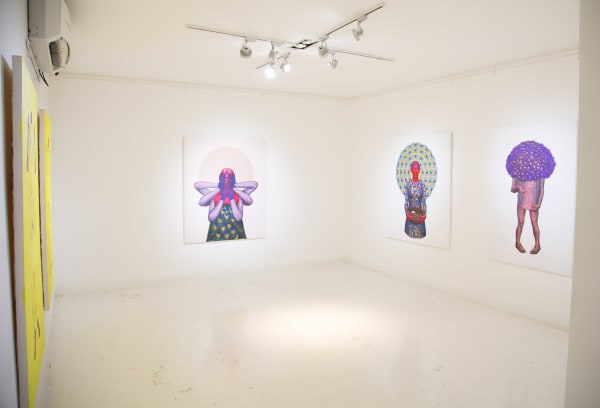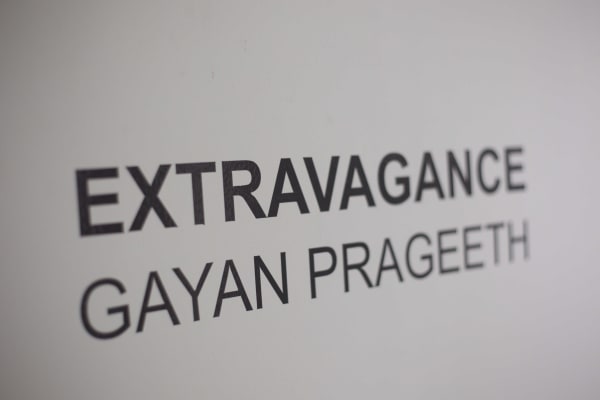Extravagance : Gayan Prageeth
After over a year of preparation, Prageeth presents a series of ten paintings contemplating Sri Lanka's previous ruling regime. The artist defends the exhibitions timing and reiterates that the country's recent shift in power is purely coincidental. This series is a continuation of the artist's focus on Sri Lankan politics, a trend in the local art scene since the late 80s. The attention to detail in Prageeth's work also plays on the contrast hidden within his title
'Extravagance', a word that can be used in both a negative and positive context. The story behind each work connects strongly with political, governmental and social extravagance.
EXTRAVAGANCE
GAYAN PRAGEETH
28 MARCH - 25 APRIL 2015
Gayan Prageeth presented his last solo exhibition at The Gallery Cafe in 2013. The series of surreal acrylic portraits of characters representing the artist’s introspective and political views placed Prageeth on the list of established young graduates from the Institute of Aesthetic Studies. After over a year of preparation, Prageeth presents a smaller series of ten paintings entirely contemplating the previous ruling regime of Sri Lanka. The artist explains that this exhibition is not timed purposely nor is it taking advantage of the shift in power, it is purely a continuation of the artist’s focus on concepts of political nature, an obvious trend in the local art scene since the late 80s. The attention to detail in Prageeth’s work also plays on the contrast belonging to his title 'Extravangance', a word that can be used in both a negative and positive context. The story behind each work ties strongly with the theme of the exhibition and the detail in each painting plays on the reoccurring theme of beautification in local contemporary art (implying the artificial disguise of development on the face of a suffering economical and social situation).
What is the meaning behind the title Extravagance?
I began preparing for this exhibition last year. In the past regime everything seemed to happen like a carnival. The riots in Aluthgama for example, the violence was performed with such extravagant publicity that is became a performance of sorts. Much like people in Sri Lanka prepare for a party, painting walls and covering things with polythene, the last regime placed effort in presenting everything, or covering it up in the same hand.
Is this word used in a negative or positive context?
That is up to viewer to decide according to my work. For me, the whole country was taken up by extravagance over the last five years. The government had to present extravagance and use extravagant means to cover up their wrong doings.
Why is there now a shift to an entirely politically conceptual series of work while your previous exhibitions presented more psychologically introspective concepts?
This is not a change; my early works were often focused on political concepts. It's not the first time I have discussed political concepts. It was more from a practical perspective than any personal reason that I focused on different topics for exhibitions. This time however I have presented an entire series of works that focus on the political history of Sri Lanka. This is not a change or a new thing for me as an artist.
Are there some of your earlier themes in this exhibition, as some of the imagery is not as obviously referring to the political?
No, most of my works have been influenced by the effect of recent politics on the country. For example, Pond of Dreams was inspired by an experience on a visit to Independence Arcade, particularly the fish swimming under your feet as you walk on the glass fishpond at the entrance. People come to see the renovation of the arcade by the bus-load after seeing the promotion of it on TV. They leave with confusion as they cannot actually interact with the location, they cannot afford what is on offer and they leave not having experienced much. The people cannot touch the fish; this is the metaphor I use in my painting for the confusion in this experience.
What is the meaning of the work titled Floating Rock?
During the time of Buddha, there was a king name Kosol who had dreams which he discussed with Buddha. One of the dreams was the sight of black rocks floating in the water. Buddha explained to King Kosol that rocks cannot float in water, therefore this was a sign of people pretending to be something they are not. Their outward appearance appeared strong but in fact inside they were not made up of the same strength. This again represents the previous regime and how I believe they presented themselves to the country.
What do you feel is the effect on you as an artist and the artist community of the political change in the country?
Nothing has really changed. In terms of situation, some things have certainly changed, but I have not planned this show timed with any political situation. When I planned this exhibition I was willing to take the risk of explaining my ideas and thoughts on the current affairs that I wanted to express. I don't feel there is a huge change or effect on the art scene. I just feel one mask has been shifted to another. Art is still a form of expression that is not understood by many and it is not considered a threat to any government. During the previous regime my work and expression was not threatened, I was able to be open about my views and I believe the same to be for other artists.





